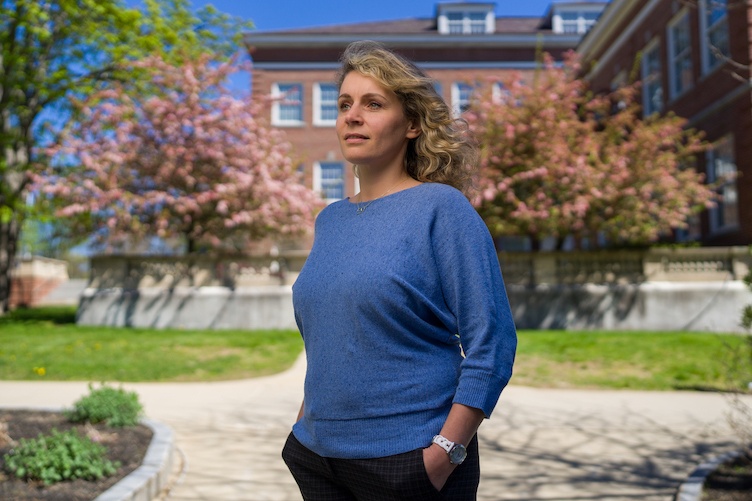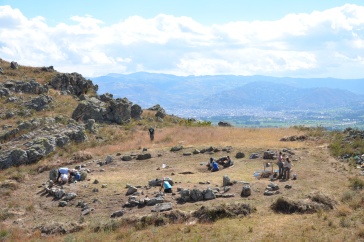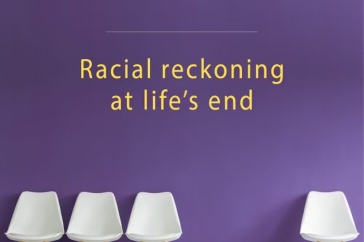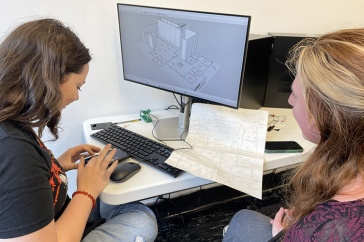
In the first days of the Russian invasion of Ukraine, Olivia Babin, administrative coordinator in UNH’s languages, literatures and cultures department, couldn’t sleep.
“All I did was text my family, ‘Are you alive?’ and then I would text another sibling, ‘Are you alive?!’” recalls Babin. “I was so scared not knowing what to do.”
Originally from Kyiv, Babin was anxiously awaiting word from her family still living in the region — her parents, four siblings, and their families, 18 people in all, nine adults and nine children under the age of 15.
She finally heard: They were safe, but scared. In the coming days the fighting escalated, and as the world’s attention turned toward Ukraine, Babin’s attention was on her family and friends in crisis.
“In those first 10 days, I came into work to distract myself, but all I could think about was my family. I remember I would put on my coat, close my door in my office and lay on the floor here and just cry all the time, in solidarity with those in the bomb shelters in Ukraine,” she recalls.
Babin shared her story during a webinar in March hosted by the College of Liberal Arts. While Kurk Dorsey (History department chair and professor) and Alynna Lyon and Jen Spindel (political science department professors) gave context to the conflict, it was Babin’s emotional first-person account that personalized the war for those in virtual attendance.

Discover this story and much more in the Summer 2022 edition of UNH Magazine, which is live online now.
Learn about Jude Blake '77, whose philanthropy has made a significant impact throughout UNH; hear from students who were able to take advantage of study abroad opportunities once again after pandemic restrictions were lifted; celebrate the career accomplishments of Marty Scarano and Sean McDonnell '78, who both retired last year, leaving lasting legacies in UNH Athletics; and much more.
Visit magazine.unh.edu to explore the complete issue.
Watching and worrying
On the commute from her Pembroke home to the Durham campus, Babin typically listens to the news on public radio. Leading up to Feb. 24, she didn’t like what she was hearing.
“They kept having stories wondering if the Ukrainian people are going to fight, and I thought this is very strange, and there’s never been so much attention given to Ukraine in American news coverage. It started to frighten me,” she says. “I told my family ‘This is what I’m hearing; something big and heavy is coming.’”
Their response was similar to that of many Ukrainians at the time: If something were to happen, it would be something minor, or something on a political level, but nothing involving civilians — don’t worry, they said.
But when Babin heard the news of the first bombings, she called her family: The war had started. They were in disbelief.
“The majority of the population just could not comprehend it,” she explains, noting that despite what some Americans picture of her home country, it’s usually a peaceful place. She said in many ways Ukrainians and Russians share a history and heritage — she grew up speaking Russian. “We grew up hearing stories of our grandfathers fighting in World War II, and how now, almost 80 years later can this happen? It’s unbelievable.”
While her brothers and father are required to stay in Ukraine (under the martial law declared by Ukrainian President Volodymyr Zelensky), her mother, as well as her sister and brother-in-law and their children, made their way out, thanks to their tourist visas. “The second night of the invasion, when my sister saw the sky lit up red and orange, she said, ‘We have to leave.’” They packed anything they could in 20 minutes, and started what would be a 12-day trek that eventually brought them to New Hampshire.
“We share everything. It gives me a little comfort because we can do some activities together, we can cook together, talk, cry together, and support each other,” says Babin of her full house.
Arrival in the U.S.
Babin relocated to the U.S. with her husband more than 15 years ago, and originally settled in Manchester. She already had a teaching degree from a college in Ukraine, but it wasn’t recognized here, so she started building her academic resume; first with community college classes, then with a bachelor’s degree in social sciences, and then an M.Ed. in community engagement with a higher education concentration.

She worked as a medical interpreter at Dartmouth Hitchcock and as a refugee case manager for those coming from Sudan, Somalia and Bhutan. In 2018, she started working in COLA’s Languages, Literature and Culture Department.
“I want students at UNH to take languages and be introduced to our faculty, most of whom are from other countries. I felt like it was a perfect fit for me because I could be a part of the community with my colleagues who also come from international backgrounds. I wanted to have a sense of belonging, and I really feel it here.”
That sense of community was evident in the support she received from her UNH community — from deliveries of food to offers from fellow administrative staff to help carry her workload.
“This is not something typical in my culture, but I’m learning so much about how people can support each other. Even a meal or two; it really helps.”
Next steps
For now, Babin’s goal is to find a way to adjust her family’s visas so they can find work and so her nieces and nephews can attend school. She hopes her brothers and father will be able to come to New Hampshire, even if the transition is difficult.
“I know what it means to restart your life in a different country. Whatever you achieved in one place, you almost have to revert and begin again, with the language, the culture, understanding people, learning the way things work. It’s not easy.”
As she follows the American coverage of the war, as well as the Ukrainian and Russian coverage, Babin says she’s not hopeful about a resolution.
“Most of my family believe that this will stop, but personally, seeing three sides, I don’t think it’s going to stop. I see that Russia is genociding Ukrainian people, but it really is fighting the West,” she explains, believing Russian leader Vladimir Putin has bigger plans beyond eastern Ukraine. “All I hear in the Russian coverage is ‘Our Western partners are no longer partners to us,’ and I think Russia is going to be even more aggressive.”
She is encouraged by the support she receives and the random acts of kindness from strangers — Granite Staters flying the Ukrainian flag, for example, does make a difference.
“Now everybody can realize what these colors mean; it gives a little hope for Ukrainian people. We know we’re not alone, and that the whole world sees what is going on.”
-
Written By:
Michelle Morrissey ’97 | UNH Magazine | michelle.morrissey@unh.edu
















































